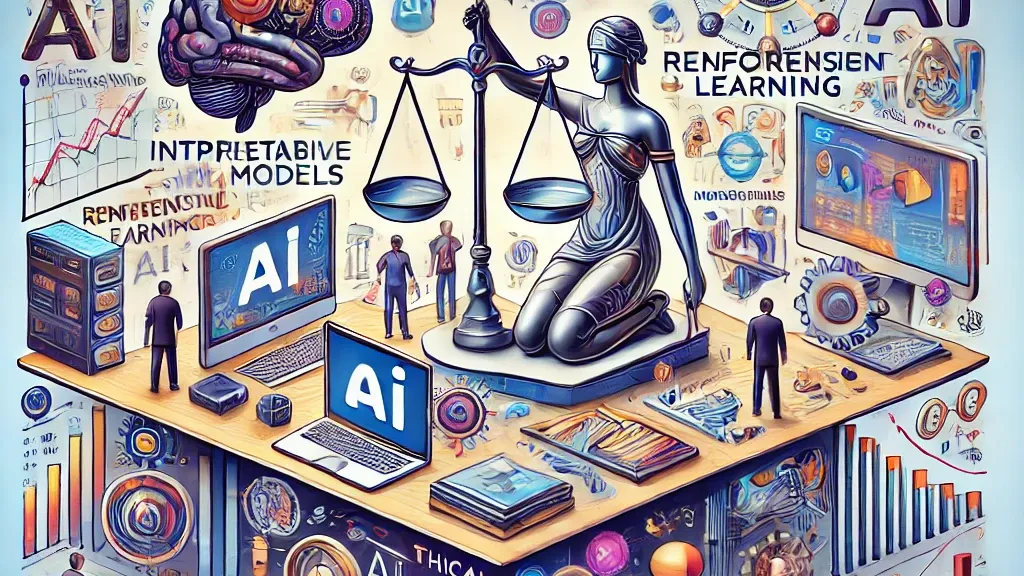Artificial Intelligence (AI) continues to be a transformative force, driving innovation across industries. Recent publications in top academic journals have shed light on the evolving trends, breakthroughs, and methodologies shaping the AI landscape. This article explores key insights from these publications, focusing on software development, mathematical modeling, and measurement systems in AI research.
Latest Trends in AI Research
1. Interpretable and Ethical AI A growing number of studies emphasize the need for interpretable AI models that ensure transparency and fairness. Researchers are addressing biases inherent in data and algorithms, aligning AI systems with ethical standards. Journals like Nature Machine Intelligence have featured groundbreaking work in explainable AI (XAI), showcasing frameworks that enhance model interpretability without compromising performance.
2. Generative AI and Multimodal Systems Generative AI models such as GPT-4 and Stable Diffusion have revolutionized content creation. Current research explores multimodal systems that integrate text, image, audio, and video processing. Recent papers highlight advancements in aligning generative capabilities with user intent, opening doors for innovative applications in creative industries and beyond.
3. Reinforcement Learning and Autonomous Systems Reinforcement Learning (RL) continues to dominate research, particularly in robotics and autonomous systems. Journals like The Journal of Artificial Intelligence Research (JAIR) report on RL models optimized for dynamic environments, focusing on real-time decision-making and energy-efficient operations.
Leading Authors and Influential Publications
Prominent authors shaping AI research include Geoffrey Hinton, Yann LeCun, and Fei-Fei Li, who have published extensively on neural networks, deep learning, and ethical AI. Emerging researchers like Chelsea Finn and Jitendra Malik are contributing significantly to reinforcement learning and computer vision, respectively.
Recent influential publications include:
- “The Ethics of Artificial Intelligence” (by Kate Crawford, featured in AI & Society).
- “Scaling Laws for Neural Language Models” (by Jared Kaplan et al., published in OpenAI Research).
Statistical Trends in AI Research
- A 2024 study by ACM Transactions on Artificial Intelligence reveals a 35% year-on-year increase in publications on generative AI.
- 62% of recent papers focus on AI’s societal impacts, indicating a shift towards interdisciplinary research.
- The use of pre-trained models has risen by 40%, emphasizing their centrality in modern AI development.
Advances in Software Development and Research Models
1. Frameworks and Tools The development of AI software is increasingly reliant on frameworks like TensorFlow, PyTorch, and JAX. Recent updates to these platforms incorporate state-of-the-art functionalities for large-scale model training and deployment.
2. Mathematical and Research Models Mathematical modeling underpins AI advancements. Notable contributions include stochastic optimization algorithms, game-theoretic approaches for multi-agent systems, and Bayesian models for uncertainty quantification. These methodologies are crucial for developing robust and scalable AI systems.
3. Measurement Systems Evaluating AI systems’ effectiveness is an area of intense focus. Metrics like F1-score, BLEU, and the AI Robustness Index (ARI) are being enhanced to assess model performance comprehensively. Academic journals emphasize the importance of developing context-sensitive measurement frameworks that capture real-world applicability.
Here’s a list of notable academic journals dedicated to Artificial Intelligence research:
- Nature Machine Intelligence Focuses on AI, machine learning, and robotics, emphasizing both theoretical and applied aspects.
- Journal of Artificial Intelligence Research (JAIR) A leading open-access journal that publishes research covering all areas of AI.
- Artificial Intelligence Published by Elsevier, this journal emphasizes the theoretical foundations and practical applications of AI.
- IEEE Transactions on Pattern Analysis and Machine Intelligence (PAMI) Highlights research in pattern analysis, machine learning, and computer vision.
- ACM Transactions on Intelligent Systems and Technology (TIST) Covers AI topics, including intelligent systems, machine learning, and applications in real-world systems.
- AI & Society Explores the social, cultural, and ethical dimensions of AI, blending interdisciplinary perspectives.
- Machine Learning Journal Focuses on algorithmic and theoretical advancements in machine learning.
- Neural Computation Publishes research on neural networks and computational neuroscience, integral to AI modeling.
- Data Mining and Knowledge Discovery Covers machine learning and AI applications in data mining, predictive analytics, and decision support systems.
- Proceedings of the AAAI Conference on Artificial Intelligence (AAAI) Contains cutting-edge research presented at one of the premier AI conferences.
These journals are highly regarded for their contributions to advancing AI research and applications.
Here are some notable AI journals with corresponding LinkedIn pages:
- Artificial Intelligence Journal
- IEEE Transactions on Pattern Analysis and Machine Intelligence (PAMI)
- ACM Transactions on Intelligent Systems and Technology (TIST)
- AI & Society
- Machine Learning Journal
- Neural Computation
- Data Mining and Knowledge Discovery
- Proceedings of the AAAI Conference on Artificial Intelligence (AAAI)
Following these journals on LinkedIn can provide you with timely updates on publications, research highlights, and discussions within the AI community.
The Road Ahead
As AI research evolves, the integration of interdisciplinary approaches will be vital. Collaboration between computer scientists, ethicists, and domain experts will drive the development of AI systems that are not only powerful but also responsible and inclusive.
For professionals in the field, staying abreast of these trends is essential. Engaging with the latest academic publications and contributing to discussions on AI’s future can foster innovation and guide the responsible deployment of this transformative technology.
Let’s continue the conversation! What are your thoughts on these trends? Feel free to share insights and engage with the community in LinkedIn https://www.linkedin.com/pulse/exploring-latest-trends-artificial-intelligence-insights.
#ArtificialIntelligence #AIResearch #AcademicJournals #AITrends #MachineLearning #GenerativeAI #SoftwareDevelopment #MathematicalModeling #ExplainableAI #ReinforcementLearning #Innovation #TechnologyTrends @NatureMachineIntelligence @JournalofAIResearch @OpenAI

